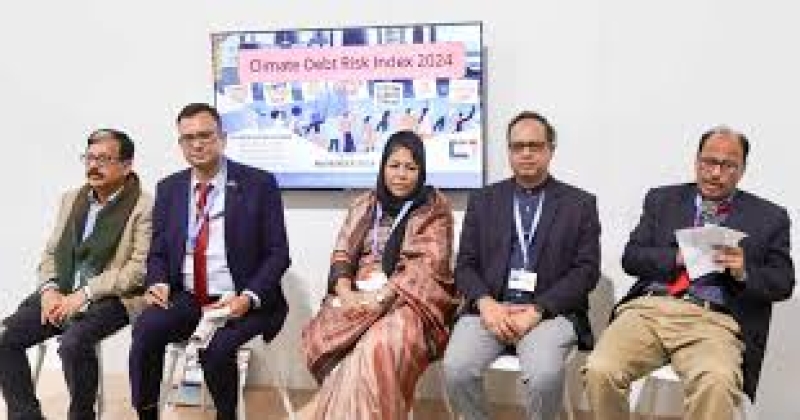- Body of Osman Hadi Returns to Dhaka From Singapore Late |
- Fakhrul condemns attacks on media, calls for unity, justice |
- 2 cops among 4 hurt in clash outside Indian Assit H.C. in Ctg |
- Inqilab Moncho urges people to avoid violence |
- Hadi’s death: Prothom Alo, Daily Star offices set afire |
Bangladesh Faces $79.61 Per Capita Climate Debt: CDRI

Bangladesh is grappling with a disproportionate per capita climate debt burden of $79.61, as outlined in the Climate Debt Risk Index 2024 (CDRI) report released by the Change Initiative (CI). The report calls for a major overhaul of the global climate finance system, highlighting the urgent need for grant-based financing, full debt relief, and a transition to a nature-based economy to combat rising climate debt.
The CDRI analyzes 20 of the most climate-vulnerable Least Developed Countries (LDCs) and reveals alarming trends that threaten equity, justice, and sustainable development in climate finance. Countries such as Mozambique, Madagascar, Myanmar, and Sri Lanka are among the highest at risk, with Madagascar’s Climate Debt Risk Index projected to reach 81.41 by 2030.
Since 2009, the total climate debt of these 20 LDCs has skyrocketed, rising 24-fold from $0.88 billion to $21.25 billion in 2022. In Bangladesh, the Climate Debt Risk Index (CDRI) has been steadily increasing, signaling worsening fiscal vulnerability despite the country's heightened exposure to climate impacts. Bangladesh's Climate Risk Index (CRI) score of 28.33 underscores its deep vulnerability to climate-induced disasters.
In addition to the report's findings, insights from Nature Conservation Management (NACOM) provided further context on Bangladesh’s devastating experience with natural disasters over the past two decades. The economic toll of climate-related events, such as Cyclone Sidr (2007), which caused $1.7 billion in damages, and the 2022 floods and landslides, which inflicted $1 billion in losses, underscores the urgent need for climate justice.
During a COP29 side event in Baku, Azerbaijan, on November 14, M Zakir Hossain Khan, Chief Executive of Change Initiative, delivered a keynote emphasizing the need for a transition from a greed-based economy to one focused on nature-based prosperity. He called for a global financial system that is more equitable and just, particularly for the world’s most vulnerable nations.
Khan said, “The global financial system must be reformed towards natural rights-based equity and justice in climate finance mechanisms. Transitioning to 100% grant-based adaptation funding by 2025 will strengthen equitable climate resilience for the most affected communities. Accelerating debt cancellation through 'debt-for-climate swaps' will enable vulnerable nations to prioritize sustainable climate investments.”
He also stressed the need to mobilize $480 billion annually by 2030 to meet the targets of the Paris Agreement and ensure climate resilience for vulnerable countries.
SM Munjurul Hannan Khan, Executive Director of NACOM, highlighted the devastating economic impact of recent natural disasters in Bangladesh. “Natural disasters have inflicted staggering damages—$1.7 billion during Cyclone Sidr, $1 billion from the 2022 floods, and $583.4 million from Cyclone Remal in 2024—crippling livelihoods in agriculture and fisheries,” he said.
Madhav Karki, Chief Adviser for Forest, Environment, and Climate Change in Nepal’s Ministry of Forests and Environment, stressed the importance of prioritizing climate justice in global finance, urging LDCs to unite and demand their fair share under the New Collective Quantified Goal (NCQG).
Fazle Rabbi Sadek, Bangladesh's lead negotiator for climate finance, condemned unethical practices in climate finance accounting, emphasizing that LDCs deserve at least 12% of the global carbon budget to ensure equity. Farhina Ahmed, Secretary of the Ministry of Environment, Forest, and Climate Change, Bangladesh, reaffirmed the country’s stance at COP, stating, “Bangladesh and other LDCs are not at COP to beg for help, but to demand climate justice. A paradigm shift in the global climate regime is urgently needed.”
The report also points to the fact that, despite OECD claims of $100 billion in annual climate financing under the Copenhagen Accord, only 15% of those funds are dedicated to climate-specific efforts, highlighting a severe shortfall in meeting the needs of the most vulnerable countries.
The findings of CDRI 2024 echo a warning previously issued by M Zakir Hossain Khan at COP23, where he cautioned about the risks of a climate debt trap for vulnerable nations—a concern now substantiated by the report’s data.
The analysis shows a dramatic increase in climate debt since 2009, with countries like Bangladesh, Ethiopia, and Rwanda particularly affected. The report also reveals that the global allocation of climate funds remains skewed, with a dominant focus on mitigation efforts, leaving adaptation strategies for vulnerable communities underfunded.
To address these inequities, the report calls for the implementation of solutions such as carbon taxes, wealth taxes, and fossil fuel subsidy reforms. These measures are essential to ensure that LDCs are not left behind in the global fight against climate change.
The event featured a distinguished panel including Prof. Mizan R Khan, Research Fellow at Brown University; Prof. Abdur Rob Mollah, Chairman of NACOM; Paromita Aronee, Research Assistant at Change Initiative; and Tanjir Hossain, Global Resilience Adviser at ActionAid International. The session was moderated by Salauddin Ahmed Reza, Senior Reporter at Jamuna TV.

